WW1 Training Camp Activities - 1917
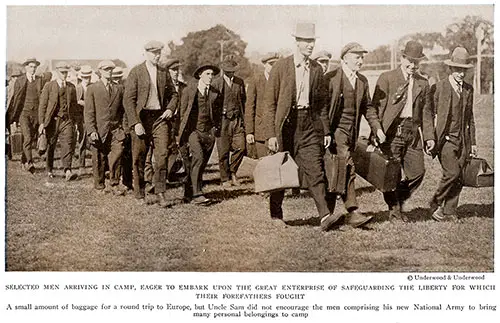
Selected Men Arriving in Camp, Eager to Embark Upon the Great Enterprise of Safeguarding the Liberty for Which Their Forefathers Fought. A Small Amount of Baggage for a Round Trip to Europe, but Uncle Sam Did Not Encourage the Men Comprising Many Personal Belongings to Camp His New National Army to Bring. Photograph © Underwood & Underwood. National Geographic Magazine, November-December 1917. GGA Image ID # 18cc369f7f
The War Department, Commission on Training Camp Activities, Washington DC, released a brochure in 1917 detailing activities to furnish these young men a substitute for the recreational and relaxational opportunities they have been accustomed to.
IN GENERAL
IN April 1917, Secretary Baker appointed a Commission on Training Camp Activities under the Chairmanship of Raymond B. Fosdick of New York. The members, in addition to the Chairman, were Lee F. Hanmer of New York, Thomas J. Howells of Pittsburgh, Marc Klaw of New York, Joseph Lee of Boston, Malcolm L. McBride of Cleveland, Dr. John R. Mott of New York, Charles P. Neill of Washington, Lieut. Col. Palmer E. Pierce, U.S.A., and Dr. Joseph E. Raycroft of Princeton University.
Jasper J. Mayer is Secretary to the Commission. To supply the normality of life to nearly a million and a half young men in training camps, and to keep the environs of those camps clean and wholesome, was the two-fold task outlined for the Commission.
When one considers that these men in the camp have left their families, homes, and friends, their clubs, churches and college gatherings, their dances, their town libraries, athletic fields, theatres, and movie houses, all the usual social relationships to which they have been accustomed—and have entered a strange new life in which everything is necessarily subordinated to the need of creating an efficient fighting force, the importance of the Commission's work becomes apparent. An army in fighting trim is a contented army; we cannot maintain contentment for the average man without the ordinary relations of life.
The task of this Commission, therefore, is to re-establish, as far as possible, the old social ties—to furnish, these young men a substitute for the recreational and relaxational opportunities to which they have been accustomed—in brief, to rationalize, as far as one can do it, the bewildering environment of a war camp.
It is also for the Commission to prevent and suppress certain vicious conditions traditionally associated with armies and training camps.
To a great extent, the Commission has employed the machinery of organizations and agencies heretofore interested along such lines in these two critical activities. Except where necessary, it has not created any new machinery.
For instance, to the Young Men's Christian Association and the Knights of Columbus, the Commission has looked to supply a large share of the club life and entertainment inside the training camps.
The American Library Association has instinctively turned for an adequate supply of books and reading facilities for the troops.
To organize the social and recreational life of the communities adjacent to the training camps, the Commission enlisted the services of the Playground and Recreation Association of America, which has placed representatives in over one hundred such communities and has harnessed the lodges, churches, clubs, and other local groups and organizations with the men in the camps.
So, too, such agencies as the Travelers' Aid Society and the Young Men's Christian Association have been brought into play with the community problem.
Suppressive work in dealing with atrocious conditions is handled by direct representatives of the Commission, with whom are co-operating such organizations as the Committee of Fourteen of New York, the Watch and Ward Society of New England, the Committee of Fifteen of Chicago, the Bureau of Social Hygiene of New York, and the American Social Hygiene Association.
Local police organizations and sheriffs and the machinery of the Department of Justice and the Military Provost Guards have been utilized in this work.
The unique problem arising from the presence of young girls in the vicinity of the camps is handled by the Young Women's Christian Association and by a Committee on Protective Work attached to the Commission.
In addition to the facilities already mentioned within the camps, the Commission has appointed sports directors, boxing instructors, song leaders, and dramatic entertainment managers.
Theatres are being erected in each cantonment to exhibition regular dramatic performances, and special facilities have been provided for the production of moving pictures, vaudeville, and other forms of amusement.
Divisional exchange officers, appointed by the Commission, one in each camp, are superintending the operation of the regimental Post Exchanges or soldiers' co-operative stores.
This constitutes a brief résumé of the machinery the Commission is accomplishing its work. To meet its expenses, Congress has made an appropriation.
The size of its task is evidenced by the fact that its activities have to do with all classes of camps and cantonments under the jurisdiction of the War Department.
Some of these camps contain as many as 50,000 men,' and we must promptly and effectively meet the problem of arranging and ordering their leisure-time opportunities.
The following pages describe more in detail the progress made along each particular line up to October 15, when this pamphlet went to press.
INSIDE THE CAMP
The Young Men's Christian Association
Dr. John R. Mott in charge
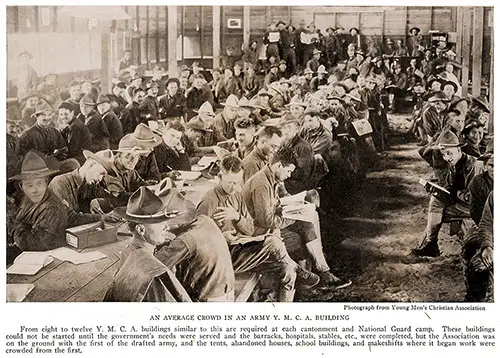
An Average Crowd in an Army YMCA Building. From Eight To Twelve YMCA Buildings Similar To This Are Required at Each Cantonment and National Guard Camp. These Buildings Could Not Be Started Until the Government's Needs Were Served and the Barracks, Hospitals, Stables, Etc., Were Completed, but the Association Was on the Ground With the First of the Drafted Army, and the Tents, Abandoned Houses, School Buildings, and Makeshifts Where It Began Work Were Crowded From the First. Photograph from Young Men's Christian Association. GGA Image ID # 182c101b78
BECAUSE of its experience in army and navy work, the Young Men's Christian Association, upon recommendation by the Commission on Training Camp Activities, was given official recognition as one of the agencies for furnishing recreational facilities within the camps. It works in close co-operation with the Commission. All its entertainments are free of charge—all non-sectarian.
From nine to fourteen recreational and social buildings are being erected in each of the National Army cantonments and each of the National Guard Camps at least six buildings.
On September 21st, contracts for three hundred and sixty-two buildings had been let. In each National Army cantonment, these include an auditorium seating three thousand. The time cantonment construction will complete almost all is done.
Over one hundred and fifty tents, 40 x 80 feet, and four hundred special outfits or equipment for Association purposes also have been provided. Each company includes, among other things, a piano, motion picture machine, phonograph, office supplies, postcards, pens, ink, pencils, stationery, reading matter, etc.—all free.
It is estimated that the service of the Young Men's Christian Association in American training camps in the next nine months will cost eleven million dollars. A private subscription furnishes this money.
3,000 Men Soon in Its Service Already over two thousand war work secretaries are in the field under appointment. Another thousand will soon be added. These men include physical directors, educational directors, etc.
The organization aims to supply every service for which there is a demand. The Young Men's Christian Association secretary has come to be the "big brother" of the troops.
The Entertainment Features
The program planned for Association buildings and auditoriums within the camps includes motion pictures, professional programs, and other forms of entertainment, such as mass singing, amateur dramatics, etc.
The plan for motion pictures involves presenting from eight million to ten million feet of film a week. This service is provided at actual cost by the Community Motion Picture Bureau.
A weekly newspaper of eight pages, "In Trench and Camp," is being published under the general auspices of the Young Men's Christian Association for each of the thirty-two National Guard and National Army camps.
The Association buildings are freely placed at the disposal of army chaplains for religious services. The same structure is often used for Catholic, Protestant, and Jewish services.
The Knights of Columbus and Other Organizations
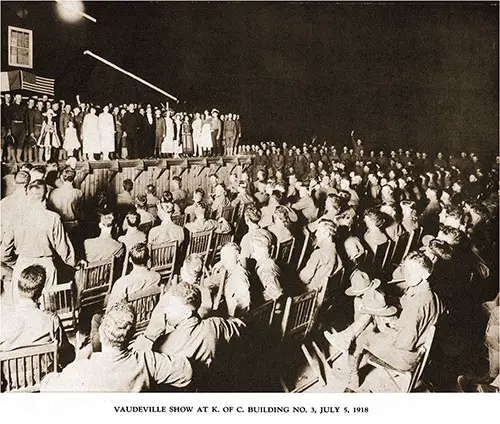
Vaudeville Show at the Knights of Columbus Building Number 3, 5 July 1918. Camp Zachary Taylor Pictorial, 1928. GGA Image ID # 1891b5dc55
Just as the Young Men's Christian Association represents the Protestant denominations, which will constitute roughly sixty percent of the new army, the Knights of Columbus represent the Catholic denomination, including perhaps thirty-five percent of the army.
While this latter society is a fraternal organization, it will sustain the same relation to the camps as the Young Men's Christian Association. It will hold no meetings to which all the troops in the camp are not invited, regardless of religion or other preference.
Indeed, the admission of both these societies to military reservations was upon the condition that they would not limit their activities to a particular constituency and that their buildings would at all times and for all meetings be open to the entire camp.
The Young Men's Hebrew Association, in its recreational work, has identified itself with the Young Men's Christian Association.
Details of Their Facilities
On October 15, 1917, there were sixty-five Knights of Columbus halls completed and in operation in the various training camps. Fifty secretaries were at work, and it is estimated that within a few weeks, two hundred and fifty representatives of the Knights of Columbus will be ministering to the general welfare and comfort of the soldiers in training camps.
Each Knights of Columbus hall is equipped with reading desks, benches, folding chairs, phonographs, player-pianos, moving picture apparatus, athletic equipment, and facilities for other entertainment. If there is a demand, debating and literary societies will be organized.
The American Library Association
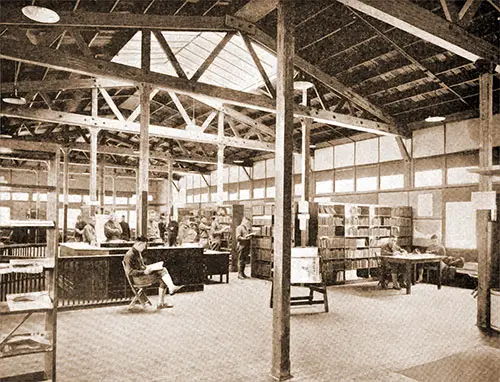
Interior of the Camp Library at Camp Grant, Rockford, Illinois. The Bellman Magazine, 17 August 1918. GGA Image ID # 18b973959d
The Commission asked the American Library Association to undertake the vital task of furnishing books, magazines, general library facilities, and trained librarians to the men in the camps. A special library building is planned for each National Army and National Guard camp. Indeed, these buildings are already in the process of construction, and the Association has raised more than one million dollars to carry on the work.
The aims of the American Library Association are :
First, librarians and library facilities are available for soldiers and sailors wherever assembled.
Second, that the libraries be maintained so that not only will the reading matter be available for the most significant number of soldiers, but that every possible encouragement and stimulus will be given to reading by the men in the service of the country.
The Knights of Columbus halls, the Young Men's Christian Association buildings, the regimental Post Exchanges, and the barrack buildings are used as distributing centers in the camps. The idea is to have a good book within reach of the soldier whenever he wants one.
Recreative Athletic Work
Dr. Joseph E. Raycroft in charge
A comprehensive organization is being developed in each of the cantonments to encourage the largest possible number of soldiers to participate regularly in some form of athletics during their leisure time. Particular stress is laid on challenging competitive sports that develop the fighting instinct.
The responsibility for the organization and conduct of these recreative athletics in each camp is in the hands of a skilled organizer and coach who is officially recognized as a civilian aide on the staff of the Commanding Officer. His salary is paid from Government funds.
Thirty such sports directors have been appointed by the Commission and assigned to posts. The supervision of this work in each camp involves the creation of a Divisional Athletic Council, supplemented by regimental councils, and by such organization among the companies as may be necessary.
The sports directors in the National Army camps will be assisted by boxing instructors, fifteen of whom have already been appointed. They will also co-operate with the Young Men's Christian Association representatives and the Knights of Columbus assigned to athletic work in the camps.
Special Stress on Boxing
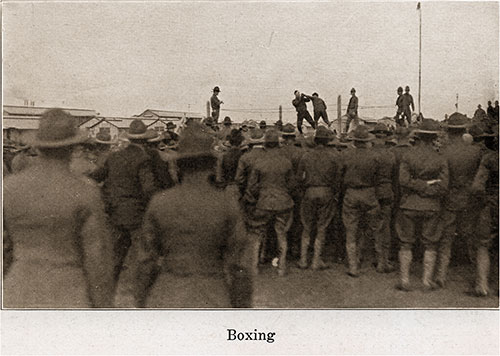
Boxing Match in Progress. Camp Grant Pictorial Brochure, 1917. GGA Image ID # 1a1797d797
Particular emphasis is laid on boxing, not only because it is an excellent sport but because of its intimate connection with bayonet fighting. A committee under the Commission has been appointed to advise on this matter: James J. Corbett, Norman Selby (Kid McCoy), Robert Edgren, Richard Melligan, and Michael Donovan.
The boxing instructors in the camps will train specially detailed groups of men who have had previous knowledge of this sport to become assistant instructors. Each camp will hold frequent boxing contests.
A set of moving pictures has been made to standardize instruction and give the troops a better idea of the work to demonstrate the fundamental principles of boxing and the elements of bayonet practice.
Equipment
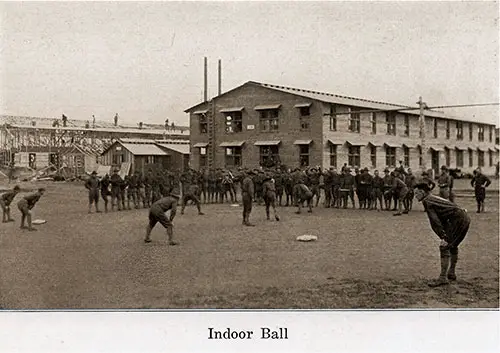
Indoor Ball - Baseball Game at Camp Grant. Camp Grant Pictorial Brochure, 1917. GGA Image ID # 1a170a553f
Baseballs, bats, basketballs, soccer balls, boxing gloves, etc., will be supplied to each company in the camps. The Government has made a small appropriation for the purchase of this equipment.
This appropriation amounts to only about one-tenth of the money each camp requires, and supplemental funds, therefore, will be necessary. The minimum athletic equipment planned for each soldier in the army will cost seventy-five cents.
The Post Exchange or Soldiers' Co-Operative Store
Mr. Malcolm L. McBride in charge
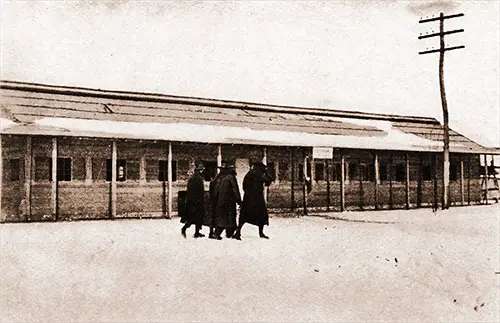
The Regimental Post Exchange Building Where Soldiers Can Purchase All Kinds of Food, Cigarettes, Stationery, Books, Postcards, Toilet Articles, etc. Camp Devens: Described and Photographed, 1918. GGA Image ID # 18eb514e5f
One of the essential activities within the camp, which the War Department has asked the Commission on Training Camp Activities to organize, is the Post Exchange.
There the soldier buys tobacco, handkerchiefs, soap, candy, and other articles not provided by the Government. At the sixteen National Army cantonments, which comprise eight or nine whole regiments, a Post Exchange for each regiment has been established.
In each camp, there is a Division Exchange Officer, selected by the Commission, who, under the direction of the Commanding Officer, has general supervision over all Post Exchanges.
Any profits accumulating to the Post Exchanges are expended in a way decided upon by the men's votes in the regiment.
According to local conditions, National Army divisions will eventually have thirteen to eighteen exchanges each. The divisions average ten exchanges each in operation at present—some of them in temporary quarters.
The gross daily business of each division is now running about $5,000, at a conservative estimate.
Camp Music
Mr. Lee F. Hantner in charge
To develop singing in the Army, the Commission has adopted the expedient of appointing song leaders in the various camps and cantonments. The plan is to extend this work until every camp in the United States is supplied with a competent leader. Congress has approved appropriations for this activity.
The results have been extraordinary, and Commanding Officers are uniformly enthusiastic over the idea of sending a singing army to France. As an illustration of the effect of the work of the song leaders, the following quotation is given from the letter of an officer:
"Between five and six thousand men participated in the most inspiring evening I have ever enjoyed. When everybody sang ' The Battle Hymn of the Republic' and Harry Barnhart got the soldiers emphasizing 'Glory! Glory! Hallelujah! His Truth is Marching on!' you should have seen the faces glowing under the lights. The camp became inspired. The men cheered and cheered.
Then the Southern boys called for 'Carry Me Back to Old Virginny ' and 'My Old Kentucky Home.' Then we sang 'A Perfect Day' and 'My Hero.' Then they called for 'Old Black Joe.' The harmony was beautiful. Automobiles way out on the road tooted their horns, and it was ten minutes before the enthusiasm subsided. We sang from eight o'clock until ten o'clock and ended with the 'Star-Spangled Banner.' I have never heard this song SUNG before. The Commanding Officer came forward after the singing and said it was the greatest thing he had ever listened to."
The National Committee on Army and Navy Camp Music was created to co-operate with the commission in this vital work. The chairman is W. Kirkpatrick Brice of New York; the other members—M. Morgenthau, Jr., of New York, John Alden Carpenter of Chicago, and Mrs. George Barrelle of Buffalo. Miss Frances F. Brundage, Supervisor of the Chicago Civic Music Association, was granted an indefinite leave of absence to become executive secretary of the committee.
A committee of camp song leaders has compiled a songbook, which has been published under the title Songs of the Soldiers and Sailors. This book has been printed and is sold at cost through the Post Exchanges.
Dramatic Entertainment
Mr. Marc Klaw in charge
A fully equipped modern theatre building seating three thousand people are built in each of the sixteen National Army camps.
A committee of theatrical managers and others, whose chairman is Mr. Marc Klaw of Klaw & Erlanger, is assisting in the organization of the talent for the program to be given in these buildings and the booking and management throughout the camps. Many of the top theatrical stars of the country are booked. These entertainments are planned to begin early in November.
An admission charge of 15c, 20c, and 25c will be made. From the proceeds, the entertainment expenses will be paid, the balance to remain as a government fund to finance non-revenue-producing activities within the camps. The plan is to make the admission fee cover the expenses. A representative of the Commission will be in charge of each of those auditoriums and be held responsible for the program. The theatres are so planned that soldiers can use them for various recreational and educational activities, winter or summer.
Redpath Entertainments
Mr. Lee F. Hantner in charge
By arrangement with the Redpath Lyceum Bureau, a tent in each National Army and National Guard camp was erected, and a first-class program of plays and entertainment was provided. They are being operated on a cost basis. The Commission will audit accounts, and any surplus receipts will be turned over to the Post Exchanges.
Entertainment Concessions
In general, no concessions to private amusement enterprises are permitted within the camps. In a few camps, however, where on account of transit or other local conditions, access is not to be had to amusements in neighboring cities, the Commission has approved concessions for motion picture and vaudeville entertainments to be conducted within privately erected theatres within the camps.
A percentage of the profits of such entertainments go to the Post Exchange, and the amusements themselves are under the close supervision of the Commanding Officers. Only a few such concessions to private enterprises have been granted.
Educational Work
An education committee, attached to the Commission, has been appointed, consisting of the following:
Dr. William Orr, Chairman; Dr. P. P. Claxton of the Bureau of Education, Department of the Interior; Dr. Harry Pratt Judson, President of the University of Chicago; Dr. John H. Finley of the University of New York; Col. P. H. Callahan of Louisville.
This committee has provided adequate French language and French geography courses in all the cantonments and National Guard training camps.
These courses are optional and are given at such hours as military duties and regulations permit. Under this plan, any soldier can, during the time of his training, readily acquire a vocabulary of six or seven hundred French words and a knowledge of French geography and customs, which will be of great assistance to him abroad.
In addition, the committee is planning to provide means for giving courses in any subject for which there is a demand. Instruction in the English language has been found necessary in connection with some soldiers drafted from our foreign population.
The committee is utilizing the machinery of university extension courses and mainly of the educational department of the Y. M. C. A. It is prepared to use any educational machinery which can readily be adapted to its purpose.
OUTSIDE THE CAMP
The Playground and Recreation Association of America
Mr. Joseph Lee in charge
EXPERIENCE has shown that the instinctive desire of a soldier with an hour of free time is to go to town, even if the town is only a crossroads.
To make the communities adjacent to the training camps the best possible places for the soldiers in their free time—to organize the social and recreational facilities of the towns so that they shall meet every need and contribute to the mental, moral, and physical health of the men in the training camps—that is the work which the Playground and Recreation Association of America is undertaking under the direction of the Commission.
Working in a Hundred Communities
Nearly one hundred communities are being helped in their efforts to prepare for the thousands of men in camp near them. Eighty-seven representatives of the Playground and Recreation Association of America are now working in these cities.
The recreation provided must be clean, wholesome, and plentiful. It must be made possible for the troops to meet the men and women of the town to provide an antidote for the homesickness, depression, and social loneliness, which are so real a menace to the morale of the men.
The community organizers, representing the Commission, are stirring the cities near the camps to realize their responsibility toward the troops who are their guests. The slogan is not "What can we make out of the soldiers?" but "What can we do for the soldiers?"
How the Results Are Obtained
Through the organization of a central committee (with several sub-committees), each of the local community representatives coordinates the activities of each agency and group of people touching and controlling the recreational resources of the town.
Churches and fraternal orders are being stimulated to entertain their soldier membership. Socials and dances are being arranged, where the troops may meet the community's young women.
Entertainment of the soldiers in the citizens' homes is one of the most popular features of the hospitality program. "Take a soldier home for dinner" has become a slogan. On one Sunday in a single community, five thousand men were thus entertained.
The public resources of the cities, such as swimming pools, showerbaths, and baseball fields, have been placed at the disposal of the men.
Provision is being made for the comfort of the soldiers and their guests by installing comfort stations and drinking fountains and by listing available hotels and lodging houses.
The cities' resources are being made available for the troops in their leisure time in every way possible. Automobile rides for the soldiers, community "sings," and band concerts are given. Restrooms and "khaki clubs" are being established; directories of points of interest and places of amusement are being published.
Assistance by the Young Women's Christian Association—Hostess Houses
Much is also done to serve the soldiers' families who visit the camps. The assistance of the Travelers' Aid Society has been enlisted, and the Young Women's Christian Association has been asked to establish "hostess houses" within the confines of each camp.
Five of the "hostess houses" have already been completed, and twenty-three more are being built. Their purpose is to afford a place within the camp where a soldier can meet his family and friends.
Through the Young Women's Christian Association and other agencies, the girls of the community have been organized into clubs and patriotic leagues, with the object of keeping them occupied in hospital and patriotic pursuits.
THE CONTROL OF ALCOHOL AND PROSTITUTION
THE problem of suppressing vice and the sale of alcohol to soldiers at or near army camps, under Sections 12 and 13 of the Military Draft Law, is being attacked from many angles and with various agencies.
The first and prime requisite is gathering complete and accurate information as to actual conditions in the neighborhood of the camps. The machinery for collecting this information has included the field agents of the Commission, the field men of the Department of Justice, the Intelligence Department of the Army, the local provost guards, as well as the staffs of such organizations as the National American Social Hygiene Association, the Committee of Fourteen of New York, the Committee of Fifteen of Chicago, the Watch and Ward Society of New England, and the Bureau of Social Hygiene of New York.
The information thus received has been utilized by the Commission, sometimes from Washington and sometimes through the representatives in the field, to secure improvement in moral conditions where such improvement was needed.
A direct representative of the Commission is now located in the vicinity of every National Army and National Guard Camp, and continuous investigations are in progress. Supervisors check the work of these representatives for given districts, who also control the work in the smaller specialized camps.
The Results Accomplished
As concrete examples of what has been accomplished may be mentioned the closing of Red Light Districts in the following cities:
- Deming, N. M.,
- El Paso, Waco, San Antonio, Fort Worth, and Houston, Texas;
- Hattiesburg, Miss.;
- Spartanburg, S. C.;
- Norfolk and Petersburg, Va.;
- Jacksonville, Fla.;
- Alexandria, La.;
- Savannah, Ga. ;
- Charleston, Columbia and Greenville, S. C.;
- Douglas, Ariz.;
- Louisville, Ky.; and
- Montgomery, Ala.
New Orleans has passed an ordinance that will wipe out its Red Light District on or about November 15th. Many cities in which no Red Light Districts were formally tolerated have, at the instance of the Commission, abolished their open houses of prostitution.
State Aid
In addition, the laws against vice have been strengthened in many cities at the suggestion of the Commission's representatives, and the machinery for the enforcement of those laws has been geared up to a higher notch of efficiency.
In California and Arkansas, State Military Welfare Commissions have been appointed by the Governors of those states, at the instigation of representatives of this Commission, and executive secretaries have been appointed to carry on the work of vice repression.
Sex Hygiene Work
A comprehensive educational campaign along the lines of sex hygiene has been undertaken in all the camps through the American Social Hygiene Association and the Young Men's Christian Association.
The broadest possible use is made of pamphlets and other literature to impress upon the communities the policy of absolute repression that the War Department has adopted. Lectures, moving pictures, and exhibits of various kinds are utilized, and extensive literature has been developed. Educational work has also been undertaken in the adjacent communities.
Committee on Protective Work for Girls
The problem created by the presence of young girls in the neighborhood of training camps has proved so great that a special committee under the Commission has been formed to urge the appointment of women protective officers in every community adjacent to a military camp and to handle the many reformative questions associated with delinquency.
Under the chairmanship of Miss Maude Miner of New York, this committee consists of Mrs. Martha P. Falconer of Philadelphia, Mrs. John D. Rockefeller, Jr., of New York, Mrs. James Cushman of New York, and Mrs. William Dummer of Chicago.
Under Miss Miner's direction, a training school for women protective officers has been opened in New York, and every effort is being made to supply the rapidly growing demand for trained workers of this kind.
Navy Department Commission on Training Camp Activities is distinct from the War Department Commission and covers a different field of work. It was appointed by Secretary Daniels in July 1917 and consists of the following:
- Raymond B. Fosdick, Chairman
- Lieut. Richard E. Byrd, U.S.N., Secretary
- Clifford W. Barnes
- Barton Myers
- Charles P. Neill
- Walter Camp
- Selah Chamberlain
- Mrs. Helen Ring Robinson
- John J. Eagan
- Joseph Lee
- E. T. Meredith
- Mrs. Finley Shepard
- Mrs. Daisy McLaurin Stevens
- John S. Tichenor
A pamphlet descriptive of its activities will shortly be published.
